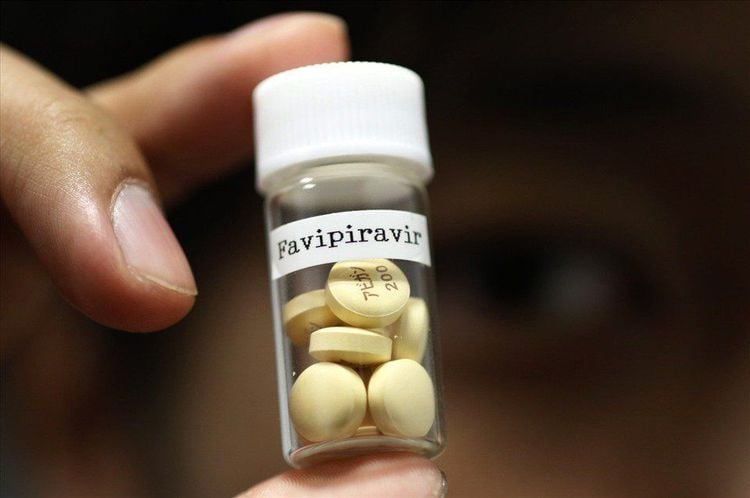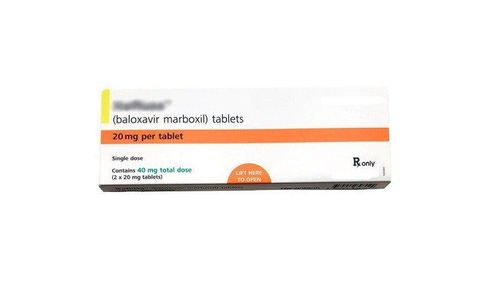This is an automatically translated article.
Article by Pharmacist Duong Thanh Hai - Clinical Pharmacist - Faculty of Pharmacy - Vinmec Times City International Hospital
Favipiravir is an antiviral drug formerly used in the treatment of illness caused by influenza viruses. In the past 2 years, the COVID-19 epidemic broke out strongly around the world, so now this drug is being used in the treatment of mild to moderate COVID-19 patients.
1. What is favipiravir?
Favipiravir is an antiviral drug formerly used in the treatment of illness caused by influenza viruses. The drug was approved and circulated in Japan since 2014. Not only used in the treatment of influenza virus strains, favipiravir has been investigated for its effectiveness in the treatment of diseases caused by Ebola virus or Lassa virus. Over the past 2 years, the COVID-19 epidemic has caused this drug to be rapidly re-researched and evaluated. Currently, the drug favipiravir 400mg is being used in the treatment of patients with mild to moderate COVID-19 with the expectation that the drug can help reduce the rate of severe progression and death from this disease. There are currently about 60 clinical trials already underway involving favipiravir in the treatment of COVID-19 worldwide.
2. Which patients should take favipiravir?
Favipiravir is currently indicated for adult patients >18 years of age with mild to moderate COVID-19 disease. The drug is not recommended for use in patients with severe COVID-19 disease. Therefore, you should not arbitrarily buy drugs from unreliable sources, because the quality of drugs will directly affect your health. Your doctor and medical staff will support you to make sure you receive effective and safe treatment.

3. Who should not take favipiravir?
Favipiravir should not be used by pregnant or lactating women. The drug can cause liver damage and increase liver enzymes, so it should be avoided in patients with severe hepatic impairment. In addition, the drug should not be used in patients with severe renal impairment. Currently, there are not enough data to use the drug in children under 18 years of age.
Doctors and medical staff will examine, evaluate, advise and discuss with you before prescribing medicine to ensure your safety.
4. How to take medicine and dosage regimen
You may be prescribed 1600mg x 2 times/day for the first day, then continue using the drug at a dosage regimen of 600mg x 2 times/day.
According to some treatment guidelines, your doctor may let you use the dose according to your weight. If you weigh 75kg or more, you will likely need to use a higher dose regimen of 1800mg twice daily for the first day, then continue with the 800mg twice daily dosing regimen.
The usual treatment time is from 7-14 days. Doctors and healthcare workers can determine the duration of treatment through a COVID-19 PCR test. You may be discontinued after PCR is negative 2 times in a row.
5. Possible side effects when using favipiravir
While taking the drug, you may experience some unwanted effects such as nausea, vomiting, abdominal pain, diarrhea, decreased appetite. Drugs that can increase blood uric acid may increase the risk of acute gout attacks, especially in patients with a history of gout, or aggravate acute gout.
The drug favipiravir can also increase liver enzymes and affect blood cells. Therefore, talk to your doctor and medical staff about any unusual symptoms, discomfort while taking the drug or when you suspect you have a side effect of the drug.

6. Points to note when using favipiravir
Before using the drug, you need to talk to your doctor about your medical history and existing diseases, especially liver and kidney diseases, gout or hyperuricemia. Favipiravir can interact with many other drugs, you need to talk to your doctor about all medications you are taking or need to take more during treatment.
As described above, pregnant and lactating women are contraindicated for favipiravir. Therefore, you need to immediately notify your doctor for treatment advice, to ensure the safety of the fetus and breast-feeding child. Talk to your doctor if you have recently received a flu vaccine (for live, attenuated vaccines) for more information. You need to complete the full course of treatment according to the regimen for optimal effect (7-14 days). At the same time, you need to strictly follow the isolation rules as advised by your doctor and medical staff, even if you have completed the regimen or no longer have symptoms to ensure infection prevention. Women should use contraception during treatment until at least 1 month after completing the regimen. If you are breast-feeding, do not breast-feed your baby while taking the drug until at least 7 days after completing the regimen. The drug favipiravir can affect sperm quality. For men, you need to use condoms or other birth control methods for at least 3 months after completing the regimen. You should also avoid having sex with pregnant women. In addition, please talk to your doctor or medical staff monitoring and taking care of you about all symptoms of illness and unusual signs of discomfort during the time of using the drug for timely advice and treatment. time.
Favipiravir is an antiviral medicine used to treat viruses that cause respiratory infections. To ensure the effectiveness of treatment, patients need to strictly follow the instructions of the doctor or pharmacist.
Please dial HOTLINE for more information or register for an appointment HERE. Download MyVinmec app to make appointments faster and to manage your bookings easily.














